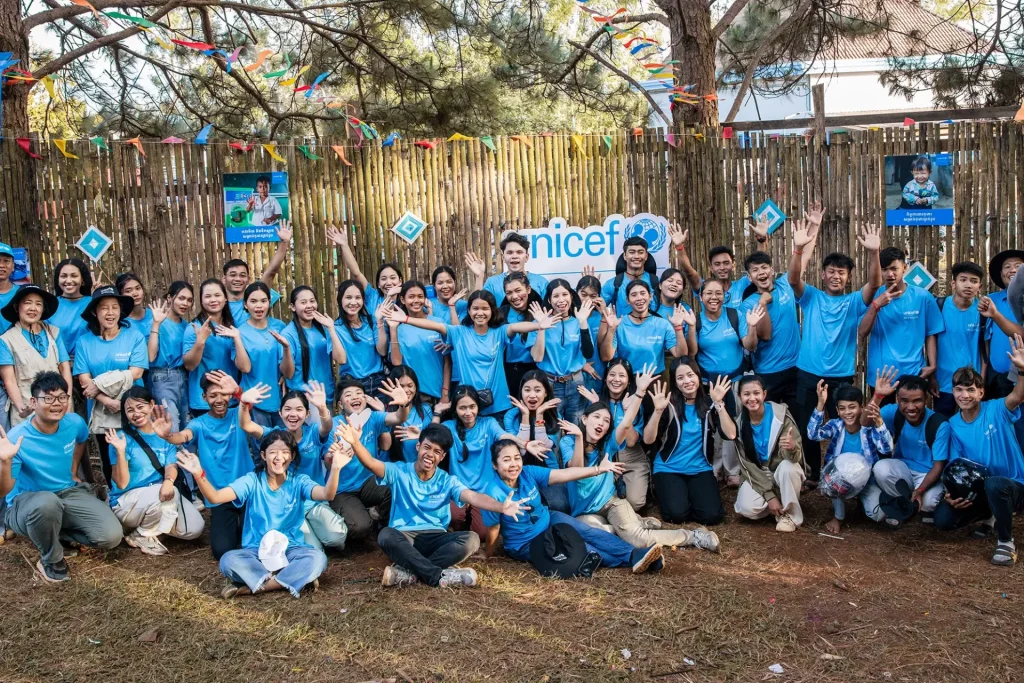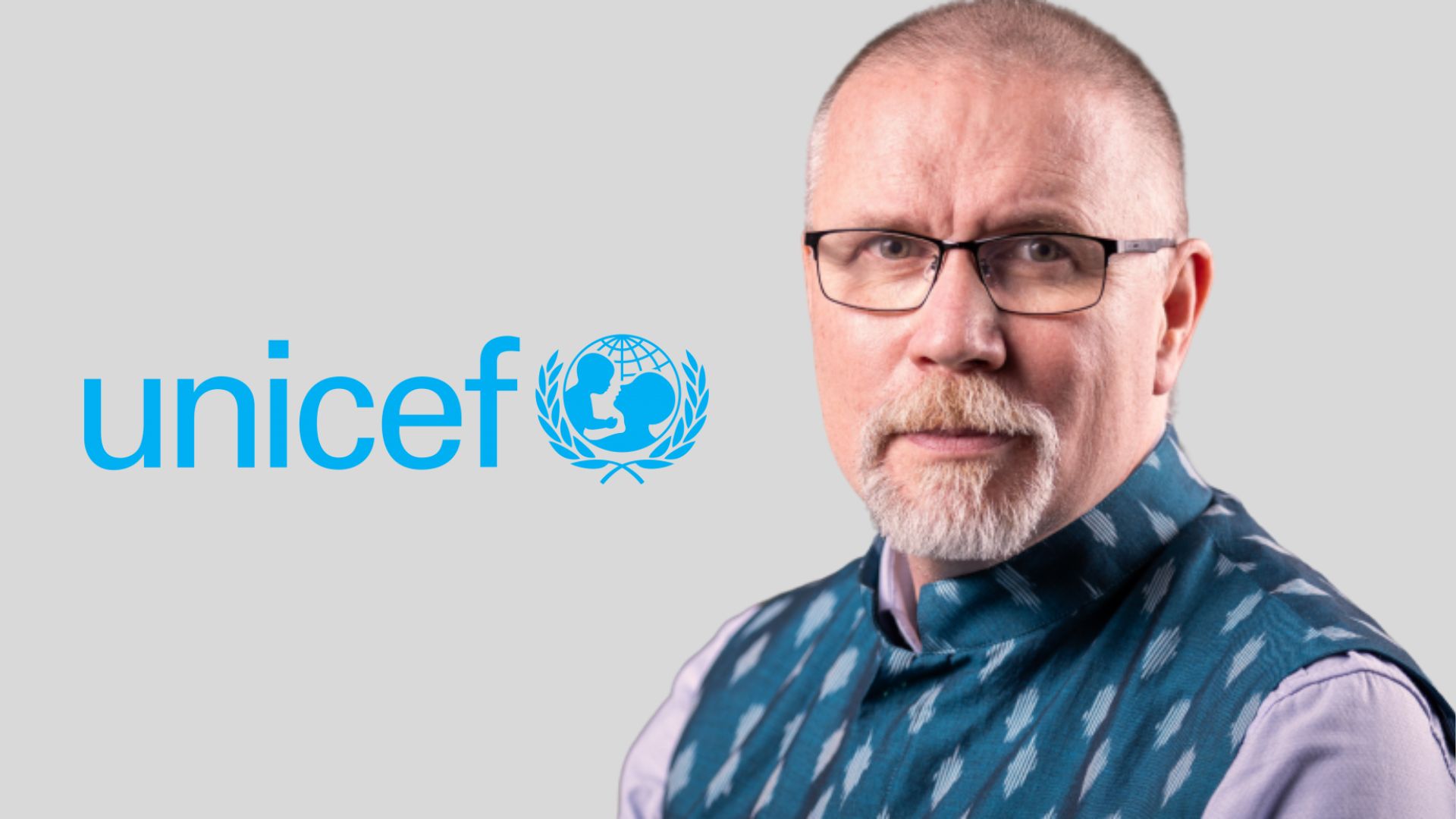Stew Post
Senior Communications Officer Stew Post spoke with Dr. Will Parks, UNICEF Representative in Cambodia. In light of the ongoing conflict at the border, they discussed the global group’s work to support affected families and the challenges of ensuring education during crises. The conversation also explored the vital role the private sector can play in safeguarding children’s interests across business operations, and, importantly, how businesses can drive innovation that can be applied to climate-resilience strategies.
Read More: EuroCham Interview: Thomas Bianco on Cambodia’s Emerging Market for Premium Cigars
Stew: Can you tell us a bit about your professional background? How did you come to work with UNICEF and what is your role in Cambodia?
Dr. Will: My career in international development began in 1993, and since then I’ve had the privilege of working in 43 countries. Before coming to Cambodia, I served as UNICEF’s Representative in Bhutan and in Iran, and held senior positions with UNICEF in Iraq, Nepal, and the Pacific Islands. Earlier in my career, I worked with the WHO and consulted for the Australian and UK aid agencies, as well as the Secretariat of the Pacific Community. I’m Australian by nationality and hold a Doctorate in Public Health and Medical Anthropology. Over the years, I’ve published extensively, including a book in 2025 entitled ‘Graceful Leadership: Inspiring hope, creativity and resilience in times of peace and crisis’, and spoken at international forums. I’m also a certified professional coach from the International Coaching Federation (ICF).
What excites me most about my role here in Cambodia is leading a team that works closely with Government and partners to improve the lives of the most vulnerable children and families across the country.
Delivered Over 80 Tons Of Emergency Supplies
Stew: UNICEF recently launched an urgent appeal for children in Cambodia impacted by the ongoing border crisis. What do UNICEF’s efforts to support children and their families affected by this situation look like?
Dr. Will: Since the start of the crisis, UNICEF has been working closely with the government, local authorities, and civil society to protect children and support families. We have delivered over 80 tons of emergency supplies, including clean water, vaccines, hygiene kits, and learning materials, and set up emergency latrines and wells to meet immediate needs.
Beyond emergency relief, we are focusing on helping children return to school and recover from the trauma of displacement. For example, more than 9,000 children in early grades are receiving Home Learning Packages and digital tools to keep learning, and 150 frontline workers have been trained to provide psychosocial first aid to thousands of affected children.
We are also supporting essential services so communities can recover, restoring water and sanitation in schools and health facilities, strengthening malnutrition screening and treatment, expanding measles vaccination, and ensuring social assistance reaches the most vulnerable families.
This is a fragile recovery, and many children are still at risk, but UNICEF is committed to working closely with the government and communities to make sure children are safe, learning, and supported through this crisis and beyond. In times of crisis, every child deserves protection.
Stew: Crises often affect child health, nutrition, and education. How can businesses play a role in ensuring continuity of these essential services, and what models of corporate collaboration have proven most effective for UNICEF in Cambodia?
Dr. Will: Businesses play a vital role in helping children continue to learn, grow, and stay healthy during crises. Their contributions go beyond financial support. They bring innovation, technology, expertise, and networks that can make emergency responses faster and more effective. The most effective collaborations are those that align a company’s strengths and assets with children’s needs—whether through education technology, health and nutrition products, or climate-smart solutions.
Respecting and supporting children’s rights requires actively safeguarding children’s interests across business operations, supply chains, and communities. It also strengthens companies by building resilient workforces, loyal customers, and sustainable markets.
UNICEF encourages companies to integrate child-focused policies and practices across their operations. One key resource is the Family-Friendly Policies Toolkit, which offers tailored guidance for businesses of all sizes and sectors—from factories and farms to offices and service industries. These policies promote, for example, paid parental leave, flexible work arrangements, breastfeeding support, and access to quality childcare. Such measures improve employee retention and productivity while supporting child development.
Another proven model is the Children’s Rights and Business Principles, developed by UNICEF, the UN Global Compact, and Save the Children. These ten principles help companies understand and address their impact on children’s rights across the workplace, marketplace, and community. They include commitments to provide decent work for young workers, parents and caregivers; ensure product safety; support children’s rights in relation to the environment; and help protect children affected by emergencies.
Technology companies are playing an increasingly vital role in advancing child rights, particularly in digital and climate resilience spaces. In Cambodia, UNICEF has partnered with private sector tech companies—most notably Smart Axiata—to deliver impactful online safety campaigns, reaching thousands of children and caregivers and empowering them to navigate digital spaces responsibly.
At the same time, innovation is helping build climate-resilient infrastructure: UNICEF is working with private sector partners to solarise schools, health centres, and WASH facilities, ensuring sustainable energy access for children and families. Through the GIGA initiative, UNICEF, and the International Telecommunication Union (ITU) are connecting schools to the internet, bridging the digital divide and enabling inclusive learning. Complementing these efforts, the Generation Future mentorship program connects young people with mentors from the private sector, helping them build skills, confidence, and career pathways in areas like technology, entrepreneurship, and climate action.
When businesses invest in children, they are investing in strong, educated communities—the very foundation of a stable, inclusive, and sustainable economy.

Creating A Stronger Foundation For Long-Term Development
Stew: UNICEF’s climate-smart programs integrate child protection, health, water and sanitation, quality education, and youth participation. How do these different areas of focus overlap and what is the value in holistic approaches to development?
Dr. Will: All of these areas are interconnected in children’s lives. A child who is healthy but has no access to clean water is still at risk. A child who attends school but suffers from trauma or malnutrition cannot learn effectively. And young people who are not given a voice cannot help shape the solutions that affect their future. The value of a comprehensive approach is that it tackles root causes, builds resilience, and ensures that children not only survive but thrive. In Cambodia, this means combining climate smart schools with clean water systems, mental health support, and opportunities for young people to engage in climate action, creating a stronger foundation for long-term development.
Stew: Corporate social responsibility and shared-value initiatives are increasingly important. What types of partnerships or investments can businesses make that both support children and communities and align with their own strategic objectives?
Dr. Will: Corporate social responsibility and shared-value initiatives are most impactful when they align with a company’s strategic priorities while delivering tangible benefits for children and communities. Businesses can make meaningful investments by applying a child-lens to their operations—considering how their expertise, products, and services can improve outcomes for children while advancing sustainability, innovation, and brand purpose.
In Cambodia, UNICEF has partnered with companies like the AEON 1% Foundation, which supports safe water and hygiene initiatives in schools and communities, and Kakao Bank, which contributes to climate resilience efforts for children. These partnerships reflect how businesses can integrate child-focused goals into broader ESG strategies.
One area of growing interest is the development of climate-smart schools and healthcare facilities. These investments not only reduce environmental impact but also create safer, healthier spaces for children to learn and grow—especially in regions vulnerable to extreme weather. By supporting solar energy, improved ventilation, and sustainable water systems, companies can help build infrastructure that protects children’s health and education while showcasing leadership in climate action.
We will soon commemorate World Children’s Day—UNICEF’s global day of action for children, by children, which is observed annually on 20 November to mark the anniversary of the adoption of the Convention on the Rights of the Child (UNCRC). This day offers a powerful opportunity to celebrate the progress made and to reaffirm our shared commitment to upholding the rights of every child, everywhere and at all times.
In Cambodia, UNICEF will mark this occasion by amplifying the voices of children and youth who are advocating for their rights. We will support them in leading and organising a joint event that highlights the challenges children and young people face and the solutions they envision. This year, the celebration will take place in Preah Vihear province on 21–23 November, drawing attention to the situation of the most vulnerable children and communities. The event will be organised in partnership with local authorities, youth groups, artists, and public-private donors, creating a vibrant and inclusive platform for dialogue, learning and art performances.
We invite the private sector to join World Children’s Day by amplifying our campaign on child rights or by engaging through partnerships and in-kind contributions. Together, we can build a stronger platform for children’s voices and drive meaningful change for every child.





